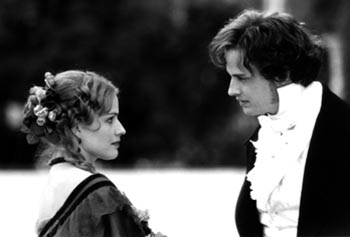Full Mooning
Even Elisabeth Shue can't save vulgarized Balzac adaptation
THE CHALLENGE of making a film of Honoré de Balzac's novel Cousin Bette (1846) is how to keep the liveliness of the story while avoiding the snobbishness. Balzac was a snob who loved to parboil in ink members of the lower orders who tried to climb out of their place. The story tells of the end of the Hulots, a family ennobled by Napoleon, a temporary sort of nobility that has been played out through the squandering of the family money. As Balzac puts it, with Napoleon gone and the wars over, Baron Hulot (played by the English comic actor and novelist Hugh Laurie) "had gone on active service--in a campaign against women." He's burned the family fortune on a series of mistresses, his latest being the opera star Jenny Cadine (Elisabeth Shue).
Watching the family's disillusion is the Hulots' poor relation, Bette (Jessica Lange), a much-patronized country cousin--and no doubt the smartest person in the story. One afternoon, Bette finds a suicidal Polish count named Wenceslas (Aden Young) trying to smother himself in the flat downstairs from her and nurses him back to health. He has ambitions as an artist, and Bette decides to become his patron. She doesn't seem to have much sexual feelings for the count, just a miserly joy in finding an aristocrat on the garbage heap. The plain, swarthy Bette is an unpaid companion to Baron Hulot's daughter, Hortense (Kelly Macdonald), a self-centered young filly who feels that the handsome count ought to be hers. In the end, Bette works her revenge on the Hulots for the countless times she's been scorned, using the venal Jenny as her weapon.
All this ought to be pure cinema; in fact, Bette Davis (born Ruth Davis) is said to have taken her stage name from the novel. Scriptwriters Lynn Siefert and Susan Tarr, however, have seriously dumbed the plot down, and director Des McAnuff, a theatrical director making his screen debut, refers to the novel as "a dusty relic." I doubt, then, if he understands the juiciness of the story, which he plays as a loud revenge farce. Some of the best scenes in the novel--such as the passages of the blunt old lecher Crevel (Bob Hoskins), hardly need punching up. McAnuff succumbs to the picturesque in adapting a novel about dirty linen, shabby sofas and a city during a depression.
In the largely wasted cast, Lange, with olive makeup and a black wig, is the most worthwhile. Yes, lately she's playing the nutter roles usually reserved for aging actresses. I suppose everyone considers this a step down, but really, given a choice, who would you rather watch: a 60-year-old Joan Crawford in a horror movie or a grandfatherly lead actor kindling some romance with an actress just out of college? It's Shue who ends up the most misused. By making Jenny a burlesque music-hall star instead of an opera singer, as she was in the novel, McAnuff bares Shue's behind in a series of costumes. I'm not averse to the sight, but I am to the context; even if Shue did make her biggest mark as a prostitute (in Leaving Las Vegas), this rangy Western girl is miscast as a French coquette. By low-balling things, McAnuff has made the film too coarse to be watched by Balzac fans--and too historical to be watched by dumb-movie fans.
[ San Jose | Metroactive Central | Archives ]
![]()

If the Shue Fits: Elisabeth Shue (left) and Aden Young in Des McAnuff's costume-drama version of Balzac.
Cousin Bette (R; 108 min.), directed by Des McAnuff, written by Lynn Siefert and Susan Tarr, based on the novel by Honoré de Balzac, photographed by Andrzej Sekula and starring Elisabeth Shue, Jessica Lange and Bob Hoskins.
From the July 16-22, 1998 issue of Metro.
![[Metroactive Movies]](/movies/gifs/movies468.gif)